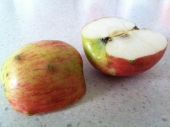
 3
3





I'm just a girl trying to fix some seriously damaged land. Seriously.




 1
1




 2
2




Jennifer Jennings wrote:Sandor, have you or any of your "fermies" had any luck with creating a kefir or kombucha that would pass for an ale or beer? I came pretty close using barley malt syrup and buckwheat honey in a 3:1 ratio, but it wouldn't hold carbonation as well as my regular water kefir made with organic sugar or succanat. Should I just add some more plain sugar to up the CO2? Any suggestions would be appreciated, as I've been concocting this brew for a friend trying to kick his alcoholism and repair his gut.

 1
1




I'm just a girl trying to fix some seriously damaged land. Seriously.




Jennifer Jennings wrote:Thanks for an exact recipe, Ross! I was just going for the taste without the alcohol and all the goodness of probiotics, but the real McCoy you posted sounds tempting to try, especially since I favor the darker types like Guinness.




I'm just a girl trying to fix some seriously damaged land. Seriously.








Pics and text about my fermentation adventures: http://brewathonlite.blogspot.com
 1
1




 1
1




Iterations are fine, we don't have to be perfect
My 2nd Location:Florida HardinessZone:10 AHS:10 GDD:8500 Rainfall:2in/mth winter, 8in/mth summer, Soil:Sand pH8 Flat












Pics and text about my fermentation adventures: http://brewathonlite.blogspot.com








Pics and text about my fermentation adventures: http://brewathonlite.blogspot.com








Pics and text about my fermentation adventures: http://brewathonlite.blogspot.com

|
If you settle for what they are giving you, you deserve what you get. Fight for this tiny ad!
permaculture bootcamp - gardening gardeners; grow the food you eat and build your own home
https://permies.com/wiki/bootcamp
|





